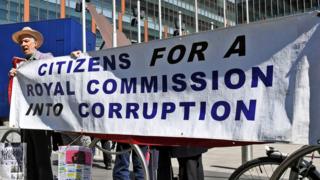Australian banking inquiry: Misconduct ‘driven by greed’
 Image copyright
Image copyright
AFP
Revelations from the banking inquiry have shocked the Australian public
Abuse and misconduct within Australia’s banks and financial institutions were driven by a culture of greed, a landmark inquiry has said.
A royal commission this year, the country’s highest form of public inquiry, has exposed widespread wrongdoing in the industry.
It released an interim report on Friday, condemning an industry which it said valued profit over people.
The Australian government called the report a “scathing” assessment.
“[The report] shines a very bright light on the poor behaviour of our financial sector,” Treasurer Josh Frydenberg said.
“Australians expect and deserve better.”
‘Profit over honesty’
Since February, the inquiry has heard numerous allegations of customer exploitation and corporate misbehaviour.
In his 1,000-page report, Commissioner Kenneth Hayne questioned why such misconduct had taken place.
“Too often, the answer seems to be greed – the pursuit of short-term profit at the expense of basic standards of honesty,” he wrote.
He also criticised what he called the inadequate actions of regulators for the banks and financial firms.
“When misconduct was revealed, it either went unpunished or the consequences did not meet the seriousness of what had been done,” he said.
What allegations did the inquiry hear?
In the past eight months, the inquiry has interviewed more than 100 witnesses in public hearings around the country. It has also received more than 9,300 submissions of alleged misconduct by banks, financial advisers, pension funds and insurance companies.
Stories about customer rip-offs and predatory practices have dominated headlines. In one case, the country’s biggest bank was found to have charged fees to dead customers, an event singled out in the report.

Media playback is unsupported on your device
The inquiry has also heard testimony about corporate fraud, bribery rings at banks, actions to deceive regulators and reckless practices.
The allegations have shocked the public, and led to the resignations of high-profile executives.
It has also prompted the government to introduce tougher penalties, such as increased jail sentences, for such white collar crimes.
Why was the inquiry deemed necessary?
The royal commission came after a decade of scandalous behaviour in Australia’s financial sector, the country’s largest industry.
Image copyright
Reuters
The inquiry has unearthed systemic misconduct within the financial sector
The government initially resisted calls for the probe before conceding that a royal commission was a “regrettable but necessary” action to restore public trust in the system.
Prime Minister Scott Morrison has faced calls for the 12-month long inquiry to be extended, and had said he is open to the idea.
The commission is due to publish its final report and recommendations in February 2019.


